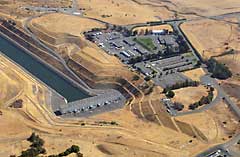Late last month, Superior Court Judge Frank Roesch gave the California Department of Water Resources 60 days to comply with the California Endangered Species Act or shut down a pumping plant that diverts millions of acre-feet of water to thirsty Southern California.
The Harvey O. Banks Pumping Plant and its related facilities near Tracy push delta water through the California Aqueduct, a man-made canal that cuts a swath through western Stanislaus County.
Water flowing down the aqueduct has transformed California's once dry and barren interior into an agribusiness powerhouse that pumps an estimated $300 billion into the state's economy.
Shutting off the pumps would have a potentially devastating effect on the state's economy. Officials at the Department of Water Resources say they won't let that happen.
"If (Judge Roesch) makes the ruling permanent," said Ted Thomas, a DWR spokesman, "we will appeal."
On Thursday, the agency filed an objection to Roesch's tentative ruling and requested a hearing within 30 days.
For decades, environmental and sport fishing groups have argued that the pumps — a vital cog in the State Water Project — are a primary reason behind precipitous declines in the populations of endangered delta smelt and chinook salmon.
Work on the State Water Project began in the late 1950s. Major components include Oroville Dam, built on the Feather River, and the aqueduct, which links the San Joaquin-Sacramento Delta to Southern California.
Roesch, in a tentative ruling issued March 22, ordered the DWR to obtain permits from the state Department of Fish and Game for the "incidental taking" or killing of endangered fish such as the delta smelt or shut down the pumps.
Without the pumps, the aqueduct would dry up.
"We're hoping against hope that (shutting down the pumps) doesn't happen," said Bill Harrison, who manages the Oak Flat Water District in western Stanislaus County. "We're sort of sitting on pins and needles out here. Our crops are already in the ground."
Harrison said the Oak Flat District provides water to about 2,000 acres of West Side farmland.
He also pointed out that Diablo Grande, a golf and resort community in the foothills west of Patterson, is a State Water Project customer that draws water from the aqueduct.
"We're still betting that reason will prevail," said Harrison, "(but) we're taking the threat seriously."
Earlier last week, Lester Snow, director of the DWR, told reporters the problems with certain species of fish, such as delta smelt, have been unfairly focused on the pumps powering the State Water Project.
"Over 90 percent of the species in the delta are introduced species," Snow said. "They're not native and that has changed a number of things, including dramatically changing the food web in the delta, and that is considered to be a significant part of this."
Snow said a number of factors are to blame, including land use changes and modification of habitat.
"Certainly, when it comes to modifying habitat, we do not deny that the (pumping) projects are having an impact," Snow said, "but my point (is) that you could cut off the pumps, lay waste to the entire economy of California and not recover delta smelt.
"I think it's important people understand that. This happens to be the easiest knob to turn in the delta, but it doesn't necessarily mean it is effective."
Shutting down the Banks pumping plant, named after an engineer who became the DWR's first director, would deal a devastating blow to the state's economy, with losses estimated at $300 billion, Snow said.
"So, we are going to do everything we can to make sure that doesn't happen, at the same time we are going to do everything we can to ensure protection and eventual recovery of delta smelt."
Snow said his agency has "multiple plans in place to make sure the economy doesn't suffer from some inadvertent response to endangered species compliance."
He said water storage facilities south of the delta, including San Luis Reservoir, are in "as good shape as to be expected for this time of year."
Groundwater basins are in respectable shape, he continued, "and most of our water agencies that we supply water have also developed contingency plans."
Environmentalists, however, say the the goal isn't a permanent shutdown of the pumps that power the State Water Project.
"Obviously, that would be drastic," said Patrick Koepele, Central Valley program director for the Tuolumne River Trust. "We'd like to see restoration of the delta, (but) we don't want to see people's tap water shut off."
Alison Boucher, project manager for the Friends of the Tuolumne, believes the pumps have harmed the salmon but said the pumps don't need to be turned off permanently.
Instead, Boucher said, the state needs to examine its pumping practices during two critical six-week periods:
In the fall, when the salmon travel from the Pacific Ocean through the delta and make their way up the Tuolumne River to spawn.
In the spring, when the young salmon begin their trek back to the ocean.
"The pumps create such strong currents," Boucher said, "the young fish don't have enough strength to break through. Some of them are weakened and fall prey to predators, and some are sucked into the pumps."
Boucher said the currents created by the pumps flow backward, moving water south into the aqueduct rather than allowing it to follow its natural course to the Pacific Ocean.
"I think the judge was sending a wake-up call," Boucher said, "telling (the Department of Water Resources) they must do a better job managing those pumps. They knew when they put them in that they would be killing fish.
"We look forward to a careful analysis of how those pumps are operated during spawning season."
To comment, click on the link with this story at www.modbee.com. Bee staff writer Michael G. Mooney can be reached at mmooney@modbee.com or 578-2384.


